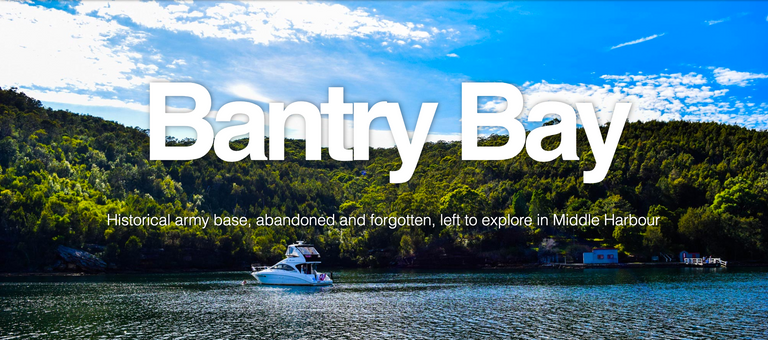
A History
Bantry Bay is a bay located in the Garigal National Park in Middle Harbour within Sydney Harbour, in New South Wales, Australia. it was named after Bantry Bay in Ireland. Bantry is the deepest natural hole in Sydney Harbour, reaching depths of up to 40m.

Bantry Bay used to store military explosives. The storage complex consists of nine explosives magazines which replaced old hulks that had been used to store explosives in nearby Powder Hulk Bay on Sydney Harbour. In 1915 the works were handed over to the state Explosives Department, which regulated the explosives industry in NSW. In 1973 operations at Bantry Bay were discontinued and the facility was closed. The NSW Government currently maintains the site and in 2003 announced it would invest A$350,000 in restoring the aging roofing.
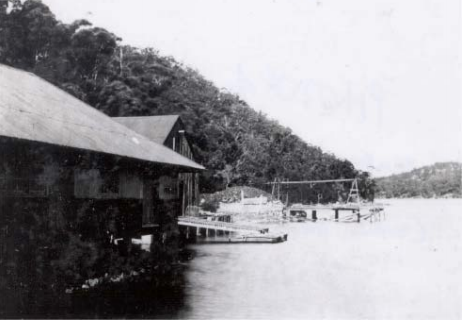
Proposed site of coal bunker at Bantry Bay, May 1918
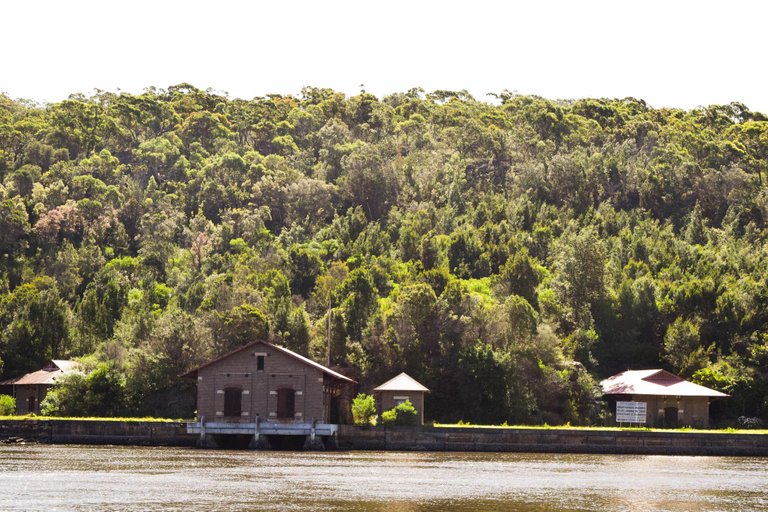
The Magazine on the water, which formerly had a dock for boats
The use of land
90 hectares of land which included the eastern and western shore of Bantry Bay, was resumed and announced as a public magazine reserve in January 1907, at a cost of $23,000. All the land surrounding Bantry Bay from the water’s edge to the summit of the hills, comprising 283 acres in total was also announced in September 1908. This reserve area was necessary to restrict urban encroachment into the unsafe, danger area.
In 1909 plans were drawn up by the Department of Public Works and £8000 appropriated for the construction of sea walls, excavation of the hillside and drainage of the cleared slopes.31 The construction and excavation of the site was very slow, which according to the Explosives Department was due to a lack of funds.
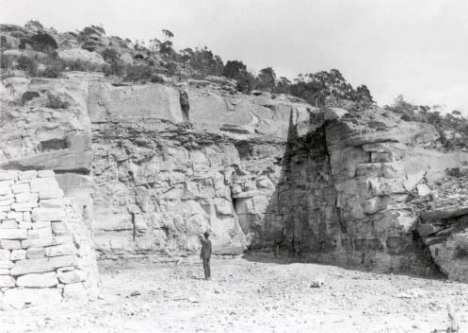
Large cutting at site of new magazine, Bantry Bay, May 1913.
Excavation
The image above shows the extent of the reclamation and the excavation of the embrasures for the magazines. The excavation involved an enormous amount of rock removal which was then used to create a new sea wall and reclamation of flat concourse areas in front of the magazines. The excavation, reclamation and sea wall, the light rail and drainage, the reservoir and two timber wharves were completed in 1913.32 A surveyor’s plan drawn in 1931 indicates the original line of the hill and the extent of reclamation of flat concourse and excavation for the magazines was extensive.
The excavation of the hillside was necessary to provide blast containment for each magazine. Each magazine is situated inside an excavated stone embrasure, some with dry stone retaining walls which were cut to contain a magazine approximately 13 x 9 metres. In some instances the embrasure has been widened after building the magazine to accommodate guttering and the roof.
.png)
Site of new magazine station, showing the removal of trees. Bantry Bay, 1913.
The site was originally designed to accommodate nine magazines, a receiving shed and an examination room. By the time the magazines opened in 1915 they were already overstocked and three temporary magazines were added which are still intact. Buildings 9, 14 and 16 were built as temporary structures in 1916, but were retained as pressures on storage capacity was a continuing problem until the 1960s. The construction technique was of a completely different nature to the nine permanent magazines, using fibro-cement on a wooden framework for internal walls, and a flat iron roof.
The close walls of the embrasure and the overhanging roof create a cool space which assists in ventilation of the magazines. A great deal of thought was put into the design of fire and explosion prevention systems, such as roof sprinklers, lightning conductors and fire fighting equipment.

My friend Josh at Bantry bay last week
A light rail system ran from each jetty to the porch of each magazine. Another line ran along the seawall, past each jetty, with a turntable system at the intersection. A branch line ran in a curve from each magazine to connect to the sea wall line. The light rail system was the only means of transporting the crates from the lighters to the magazines.
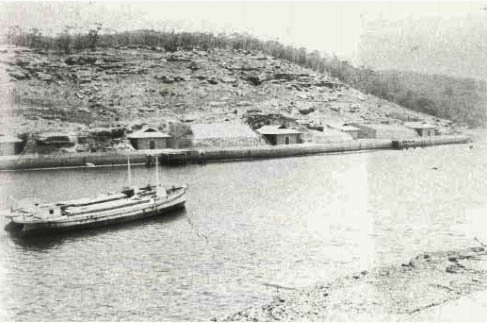
The rock face at western Bantry Bay which was completely bare, which was essential to the construction of the magazines
The end of the operation
In 1915 the works were handed over to the state Explosives Department, which regulated the explosives industry in NSW. In 1973 operations at Bantry Bay were discontinued and the facility was closed. The NSW Government currently maintains the site and in 2003 announced it would invest A$350,000 in restoring the aging roofing. As of 2006 the site remained closed to the public due to old explosive contamination at the site. However, there are good views of the site from the eastern side of Bantry Bay, which can be accessed from the Timbergetter's track, which starts at Seaforth Oval. Walking tracks also go around the west side of the magazines, providing access from the nearby residential area of Killarney Heights. The deep water in the bay worked well for the large ships to come into the bay.

Me!
Thats it for Part 1 Folks, comment upvote and follow if you enjoyed!
Honestly, listening to the description of this place, it sounds like the kinda place somebody would base an entire videogame level on.
Like, there'd be a part where you gotta get an old railcar working again, and then onto the tracks, then fight off enemies as you use it for transport. Then something would happen to it and you'd find old explosives or something and use them to set off a bomb. Something like that one mission in Far Cry 3 when you were in this ravine or something with built in side ledges and plenty of fighting space on them.
Also, that's some interesting history the place has to it too.
Everytime I read something like this I'm reminded of just how big and how unknown this world is to me and any others like me.
Anyway, that was an enlightening read. Keep it up brother ;)
Thanks for the feedback, and yeah it seems just like a game. Nice to hear you learned something (:
Aye, true that.
And yeah, thanks =)
Congratulations @sammozaffari! You have completed some achievement on Steemit and have been rewarded with new badge(s) :
Click on any badge to view your own Board of Honor on SteemitBoard.
For more information about SteemitBoard, click here
If you no longer want to receive notifications, reply to this comment with the word
STOPCongratulations @sammozaffari! You received a personal award!
You can view your badges on your Steem Board and compare to others on the Steem Ranking
Vote for @Steemitboard as a witness to get one more award and increased upvotes!